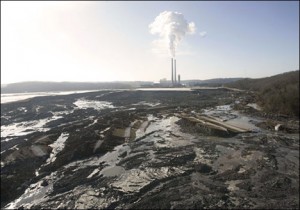
This week, a federal court gave the U.S. Environmental Protection Agency 60 days to propose a deadline for rules regulating toxic coal ash. Photo from southeastcoalash.org
After years of delays and setbacks, the clock is finally ticking on the U.S. Environmental Protection Agency to propose a deadline for federal regulations of coal ash.
On Tuesday, a federal judge gave the EPA 60 days to file a written submission setting forth a proposed deadline for its review and revision of regulations concerning coal ash, along with its legal justification for the proposed deadline.
This victory for clean water and healthy communities came almost month after the court sided with Appalachian Voices and our allies, agreeing that the EPA has a duty to stop the delays and issue federally enforceable safeguards for the toxic coal waste. You can read the memorandum issued this week by the court here.
Earthjustice is representing Appalachian Voices and many of our allies including Chesapeake Climate Action Network, Kentuckians for the Commonwealth, the Sierra Club, Southern Alliance for Clean Energy, and Western North Carolina Alliance in the case.
“Coal ash has contaminated more than 200 rivers, lakes, streams and aquifers across the country,” the groups said in a press statement. “Hundreds of additional unlined and unmonitored coal ash dumpsites exist, as well as hundreds of potentially dangerous coal ash dams. The decision by this federal court to put the EPA on a schedule for finalizing federal coal ash regulations is a victory for the communities and neighborhoods living next to these toxic sites. Federal protection is long overdue.”
Across the country, coal-fired power plants produce approximately 136 million tons of coal ash, making it one of the nation’s largest industrial waste streams. Combine that amount with inadequate state oversight, the lack of federal regulation and the fact that many impoundments are sited along major waterways and drinking water reservoirs, such as the French Broad River and Mountain Island Lake, and you’ll have an idea of how pernicious the threat of coal ash has become to the water we use for drinking, agriculture and recreation.
The Southeast is home to 40 percent of the nation’s coal ash impoundments and contains 21 of the nation’s 45 high hazard dams. Through our Red, White & Water program, we are working in communities near coal-fired power plants in western North Carolina and the Piedmont, encouraging residents to call on the EPA to release a strong rule that protects our fundamental right to clean water.



Leave a Reply